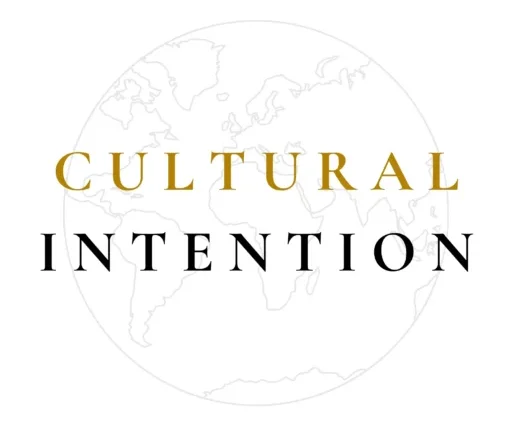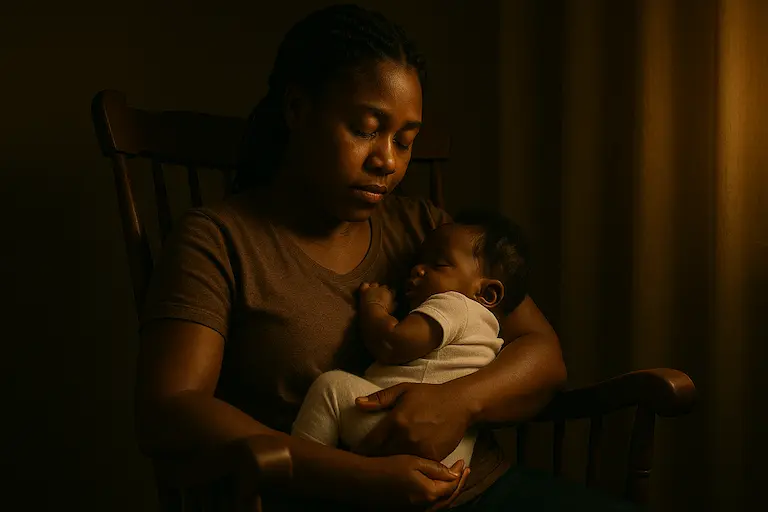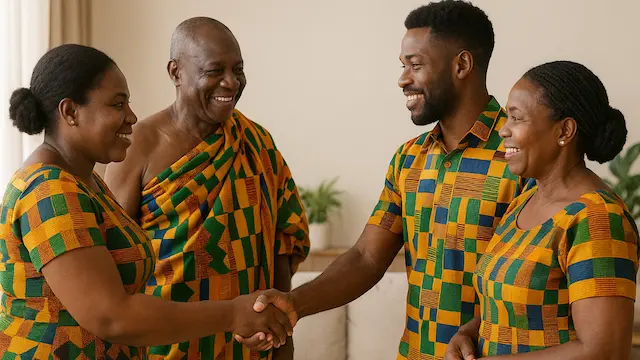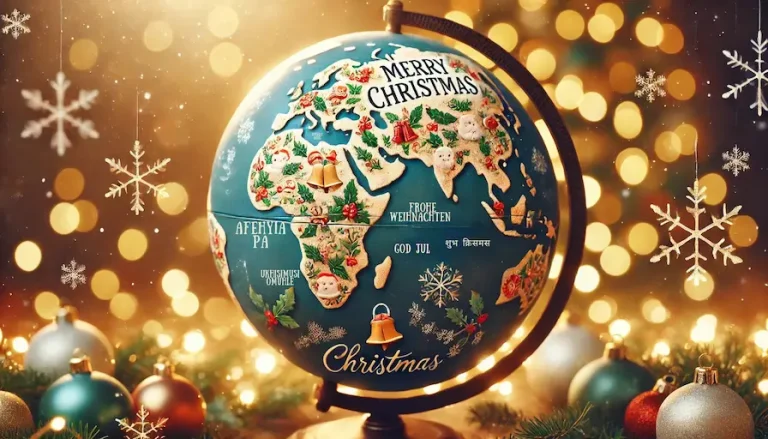What Is Culture? Simple Meaning, Everyday Examples, and Why It Matters

Have you ever heard someone say, “You have no culture”? Or been called ‘uncultured’?
It’s one of those comments that can sting, even if you don’t react immediately.
Later, the questions come.
What does that even mean? What is culture? How do I know if I have one? And how do I live it in a way that fits my life and family?
These questions often come up in small, everyday moments. For example, when a familiar dish gets strange looks, when you travel and the smells that are normal for others feel overwhelming, when you eat just the chicken meat while others chew the bones, or when your way of greeting someone suddenly needs a backstory.
Culture shows up in how we live, speak, care for each other, and carry on.
Understanding culture and how it shapes our choices helps us notice what feels familiar and unfamiliar and what’s worth keeping as life changes.
Culture is the shared beliefs, language, values, habits, and traditions passed between families, communities, or societies. It shapes how we live and how we connect.
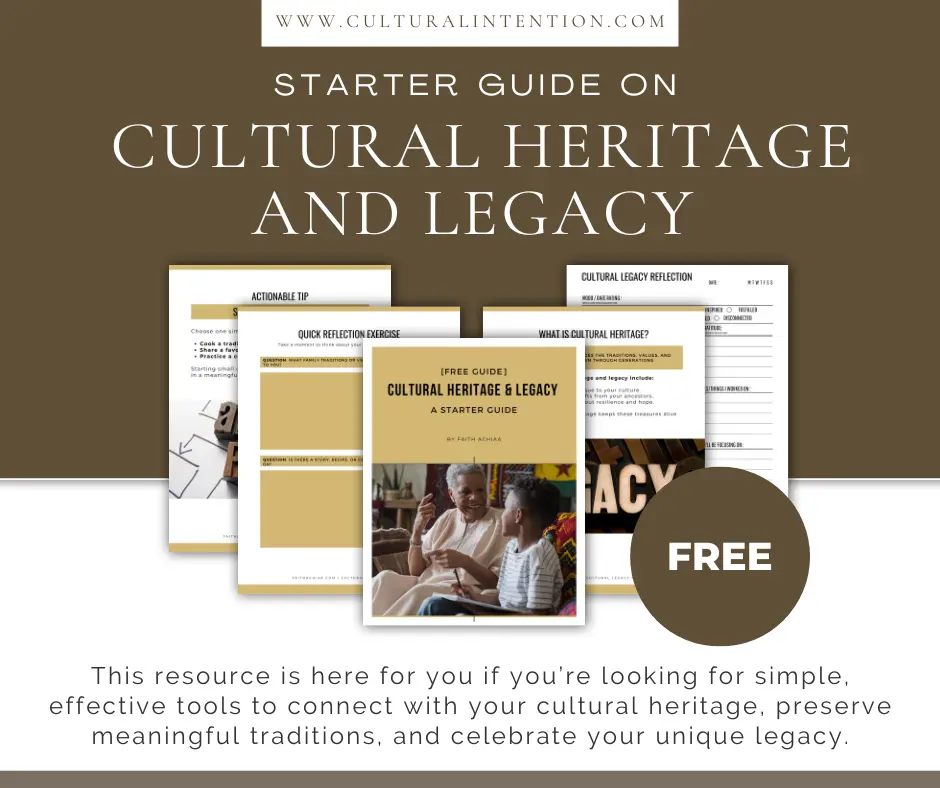
Honor Your Past.
Shape Your Legacy.
Download your FREE starter guide on Cultural Heritage & Legacy—created to help you preserve what matters, honor your traditions, and pass your story on with pride.
What Culture Is Made Of
Culture doesn’t only come from major holidays or national flags. Some parts of culture are visible, touchable, and used; others are harder to notice, but they shape us just as much.
- Material culture includes food, tools, clothing, music, and art, things that can be seen, held, or passed down.
- Non-material culture includes language, values, beliefs, customs, habits, and shared understanding. These are often felt more than seen.
Here are a few core parts of culture and how they show up:
- Values: What your family or community believes is important. Some focus on respect or obedience. Others center on independence or personal achievement.
- Beliefs: Views on life, success, faith, fairness, and what makes a “good” person.
- Language: Not just words, but tone, emotion, rhythm, and intention. A language might carry comfort or correction.
- Rituals: Habits that add meaning. It could be Sunday stew, family prayer, or how birthdays are celebrated.
- Symbols: Items, patterns, or music with deep emotional value, a wedding cloth, a childhood song, a family heirloom.
- Artifacts: Things passed down through time, such as recipes, proverbs, books, or even parenting styles.
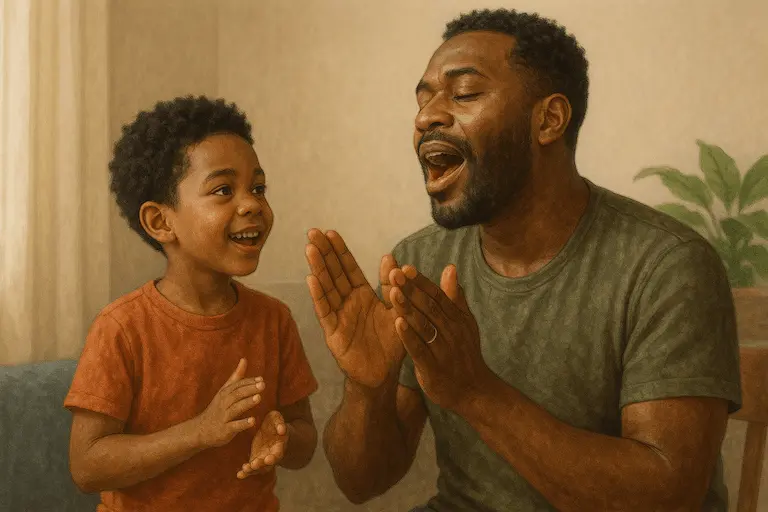
In our home, not everything passed down stayed the same. Some things held firm. Others changed gradually, especially after marriage, and they blended in with how my husband and I were raised.
That’s part of life, figuring out what still feels meaningful and no longer fits.
How Culture Changes Over Time
Culture doesn’t stay frozen. It shifts as your life does. Moving, starting a family, aging, or even changing cities or jobs can all shape what parts of your culture feel necessary or natural.
You might start a new tradition that fits your current situation or stop doing something that once made sense but no longer feels relevant.
Sometimes kids bring back something you hadn’t expected. Maybe it’s a phrase a grandparent used, a gesture, or a habit they picked up from extended family. These moments remind you that culture continues through connection and memory, even when you weren’t trying to pass it on.

Culture Shock and Misalignment
Culture shock is more than being in a new place. It’s when how you live, speak, or interact doesn’t match what’s around you, and the reaction catches you off guard.
It might be how you discipline your child, or how you don’t.
You speak up because something doesn’t sit right with you, but others consider it rude or out of line.
Your silence is read as weakness when you are trying to show restraint.
How you dress, worship, and show care—any of these can be seen as unfamiliar.
And it goes both ways. You might also feel confused or caught off guard by how things are done around you.
What’s considered polite? What’s considered urgent? What’s considered rude?

Sometimes it’s small things. I remember someone moving to the States from Ghana, and it became a running joke how they reacted to pizza for the first time.
Nobody stopped to think that if the roles were reversed, someone else might have laughed at us for responding to something unfamiliar.
For example, when people see snow for the first time and get labeled as dramatic or uncivilized, or when Indian street food videos go viral, all anyone notices is how unsanitary it seems to them.
They forget that their own ways might feel just as strange to someone else.
These reactions, whether they come with laughter, confusion, or judgment, aren’t just passing moments.
They leave an imprint. They shape how freely someone shows up next time, or how carefully they edit themselves to fit in.

Culture and Identity Are Tied Together
Culture is one way we make sense of who we are. For people with more than one cultural background, it can feel like walking between different worlds.
You might feel too much of one thing in one setting, and not enough in another.
Your background may seem like a strength at one moment, but the next, it may seem like something you must downplay or explain.
You don’t need to have every piece figured out. It helps to talk about your story during family moments, not just holidays or significant milestones.
For me, one part of that has been navigating our Ashanti cultural roots, such as understanding deities, traditional practices, and the role of libation, while also living out my Christian faith.
That balance isn’t always clear-cut, but one thing I know is that I love my culture and my faith.
Culture and spirituality can overlap, clash, or sit quietly beside each other. Talking about those layers with family has helped us stay honest about what we carry and why.
Your identity might shift depending on where you are or who you’re with, and that’s okay. You don’t have to prove anything to take pride in your origins or experience.

“Culture is not inherited. It is learned, lived, and shaped in the choices we make every day.”
Culture stays with you. It shapes how you live, what you pass on, and how you understand the world around you.
If this post made you pause or rethink your own experience, take a moment to write down what feels meaningful to you.
What are you holding onto? What have you changed? What do you want to carry forward?
You don’t need perfect answers, but reflecting on your current state can help you take the next step with more clarity and purpose.

IF THIS POST SPOKE TO YOU, EXPLORE MORE OF THE JOURNEY ON OUR SITE.
You'll find free guides, intentional tools, and reflections to support cultural growth and legacy-building.
💬 Looking for connection? Join our Facebook community to continue the conversation.
📌 Pin an image to revisit or share with someone walking a similar path.
Thank you for being here.



